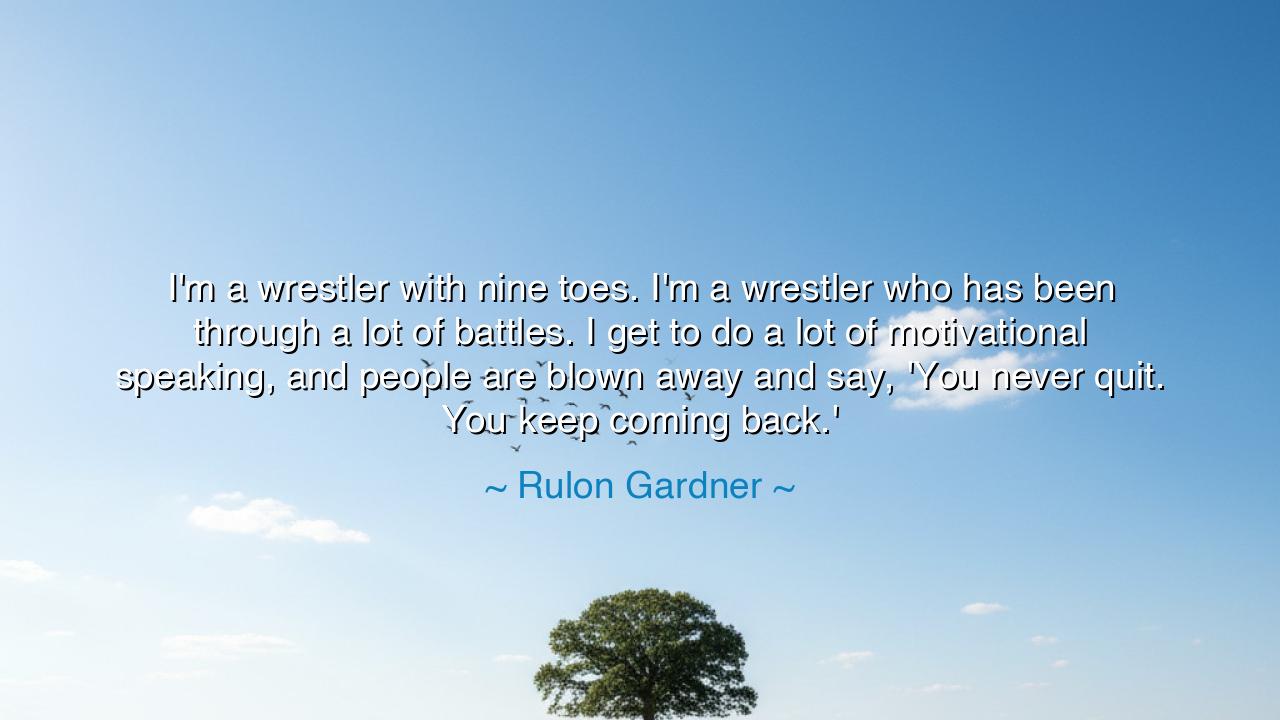
I'm a wrestler with nine toes. I'm a wrestler who has been
I'm a wrestler with nine toes. I'm a wrestler who has been through a lot of battles. I get to do a lot of motivational speaking, and people are blown away and say, 'You never quit. You keep coming back.'






Hear the words of Rulon Gardner, Olympic champion, survivor, and teacher of resilience: “I'm a wrestler with nine toes. I'm a wrestler who has been through a lot of battles. I get to do a lot of motivational speaking, and people are blown away and say, ‘You never quit. You keep coming back.’” In these words there is no boasting, but rather a testimony, carved from pain and perseverance. For Gardner’s life is not merely a tale of victory upon the mat, but of endurance in the face of loss, injury, and trials that would have broken lesser men.
At the heart of his declaration lies the spirit of endurance. Gardner is no stranger to hardship. He defeated the seemingly invincible Alexander Karelin at the Sydney Olympics in 2000, a triumph considered one of the greatest upsets in wrestling history. Yet beyond that, his battles stretched far outside the ring. He survived a snowmobile accident that left him stranded in subzero temperatures, costing him a toe to frostbite. He endured motorcycle crashes, airplane accidents, and the crushing weight of expectation. Still, his words echo a singular truth: he never quit. He bore his scars not as signs of defeat, but as marks of survival.
His words also shine with the essence of identity. “I’m a wrestler with nine toes,” he says, as though to acknowledge both his brokenness and his strength. He does not hide his loss, nor seek to pretend he is untouched by suffering. Instead, he proclaims it openly: this missing toe is part of who he is, part of the story he carries. True greatness does not come from perfection but from the courage to keep fighting with imperfection. The missing toe becomes a badge of honor, proof that he has lived through storms and emerged standing.
History bears witness to many such figures. Think of Epictetus, the Stoic philosopher, once a slave, who walked with a twisted leg after years of abuse. He could have seen his deformity as defeat, yet he turned his suffering into philosophy that inspired countless generations. Or recall Franklin D. Roosevelt, stricken with paralysis, who could not walk unaided yet led his nation through depression and war. Like Gardner, they show that the wounds of life need not silence us—they can become the very source of our motivation to inspire others.
When Gardner speaks, people are “blown away,” not because he tells them he is invincible, but because he shows them what it means to be human and to keep rising. This is the secret of motivational speaking at its deepest: not to present a flawless life, but to reveal the strength found in scars, the hope found in defeat, the power found in the act of returning again and again. His audiences see themselves in his battles. They, too, may be wounded, weary, or scarred, but in Gardner’s story, they glimpse the proof that their struggles need not end their journey.
The meaning, then, is deeply emotional and universal: to never quit is to live a life that transcends failure, loss, and pain. Quitting closes the story; perseverance allows it to be rewritten again and again. Gardner’s life teaches that true victory is not always gold medals or applause—it is the refusal to let adversity have the final word. In this, he becomes more than a wrestler; he becomes a symbol for every soul wrestling with the hardships of life itself.
What lesson, then, must we take? It is this: embrace your scars, carry your battles with pride, and never surrender your will to rise again. Do not wait for perfection to define you, for perfection never comes. Instead, live as Gardner lives: as one who bears wounds but still walks forward, as one who has fallen but still returns to the fight. Let your pain become your story, and your story the fire that lights the way for others.
Thus let Gardner’s words be remembered as a torch for all generations: “You never quit. You keep coming back.” In them lies the essence of resilience, the heart of triumph, the eternal spirit of those who refuse to be broken. May we all learn to wrestle with life in the same way—not for perfection, but for perseverance, not to be unscarred, but to be unbroken.






AAdministratorAdministrator
Welcome, honored guests. Please leave a comment, we will respond soon